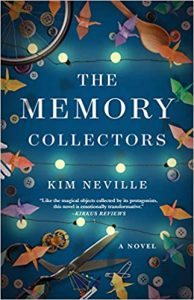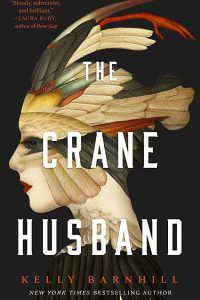Katharine Coldiron Reviews The Memory Collectors by Kim Neville
 The Memory Collectors, Kim Neville (Atria Books, 978-1-98215-758-6, $16.99, 400pp, pb) March 2021.
The Memory Collectors, Kim Neville (Atria Books, 978-1-98215-758-6, $16.99, 400pp, pb) March 2021.
The Memory Collectors relies upon a deeply poetic set of ideas. In it, objects and places give off emotional auras, which can be perceived by people sensitive to these energies. Each of the characters – Evelyn, a fragile young woman; Harriet, a lonely hoarder; Owen, a kind but somewhat mysterious artist; and Noemi, Evelyn’s careless, charismatic younger sister – perceives this sensitivity a little differently, whether as a gift or a curse or something else. The novel hardly has a plot so much as it has a series of emotional turns and revelations, so that the beauty of its ideas can claim most of the reader’s attention. For those who want to invest in a novel more concerned with character and relationships than action, The Memory Collectors is a lovely, memorable choice.
As a child, Evelyn witnessed the murder/suicide of her parents, perpetrated by her father, who had been an antique dealer and restorer, and whose mental health was questionable. As it turns out, Evelyn’s father had the same ability she has to feel the emotions embedded in objects. A pair of scissors with contagious murderous intent spurred Evelyn’s father to his terrible actions, and ever since, Evelyn has withdrawn more and more from the world. She makes a living selling objects with particularly strong “stains” – her word for emotional resonance – at a street market in Vancouver, and otherwise lives an alienated life.
Harriet feels “stains” as “brightness,” and she has spent her life collecting such objects (“treasures”), rather than trying to distance herself from them as Evelyn tends to. Despite looking like a bag lady, she has plenty of money, and her affection for bright objects looks to the layman exactly like hoarding. Owen has formed a tentative friendship with both women, and although he’s often more of a plot device than a genuine character, the novel suggests that he has the ability to sense in people what the two women can sense in objects.
When Harriet and Evelyn meet, Harriet discovers a new purpose. She wants to collect the best and brightest of her objects and curate them in a kind of museum space, “an enchanted forest built from loved objects.” The idea is for visitors to benefit from the auras of these objects, even if they cannot really tell why or how they’re being affected. Harriet needs Evelyn’s greater sensitivity to sort and arrange the objects, and Evelyn needs Harriet’s money, so they strike a bargain. Over time, Evelyn’s emotional state improves, and she develops her power with the objects in interesting directions. Eventually, Harriet’s secrets threaten to sink the partnership and even put the other characters in mortal danger. But all comes out right in the end.
The Memory Collectors has speculative elements, but they are rooted in emotion and the inner world. The ideas that power the novel are meaningful, but the story is not much more complex than it needs to be to keep those ideas afloat. However, if the book’s plot is a little thin, and overly reliant on enigma, Neville has great skill in other areas. The book is at its best when detailing the feelings and memories present in the objects the women encounter:
In the stitches of the slippers, the remembrance of friendship cohabits with the sleepy contentment of a furred creature and the simple comfort of ritual at the end of a long day. Worn into the photograph, acceptance of change and talismanic faith in the future.
Often, objects’ resonance bears little relation to their appearance. A plastic toy shark is toxic enough to require burning, and a wooden spoon evokes a secret love affair. Each button in a jar full of them has individual positive associations. These are the stories of people who have all impressed a small part of themselves into the things around them. In this way, The Memory Collectors is a profoundly humanistic novel, a book invested in what people feel and how they live, conveying all this with detail alone. Such a central notion is romantic and meaningful enough to sustain the novel, and to leave the reader with a new outlook on what she touches every day.
Katharine Coldiron is the author of Ceremonials (Kernpunkt Press), an SPD fiction bestseller. Her work as a book critic has appeared in The Washington Post, The Believer, The Guardian, and many other places. She lives in California and at kcoldiron.com.
This review and more like it in the March 2021 issue of Locus.
 While you are here, please take a moment to support Locus with a one-time or recurring donation. We rely on reader donations to keep the magazine and site going, and would like to keep the site paywall free, but WE NEED YOUR FINANCIAL SUPPORT to continue quality coverage of the science fiction and fantasy field.
While you are here, please take a moment to support Locus with a one-time or recurring donation. We rely on reader donations to keep the magazine and site going, and would like to keep the site paywall free, but WE NEED YOUR FINANCIAL SUPPORT to continue quality coverage of the science fiction and fantasy field.
©Locus Magazine. Copyrighted material may not be republished without permission of LSFF.







